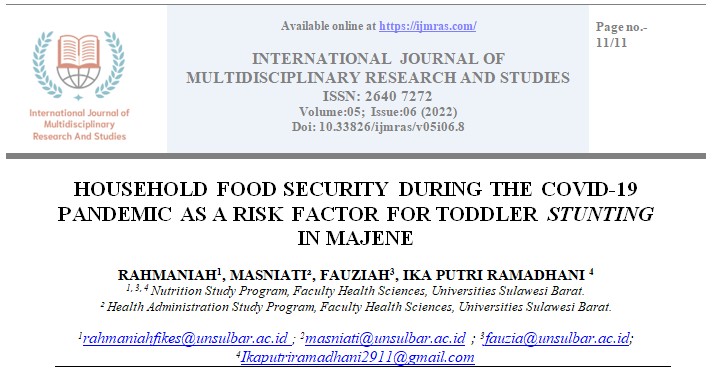HOUSEHOLD FOOD SECURITY DURING THE COVID-19 PANDEMIC AS A RISK FACTOR FOR TODDLER STUNTING IN MAJENE

Abstract
Background: Stunting is a condition of failing to grow a toddler as an accumulation of chronic nutritional problems. Toddlers are categorized as stunting if the z-score is in the range of -3 to <-2SD based on the Height By Age index. Stunting children are more susceptible to disease and contribute to a child's below-average level of intelligence. The long-term effects of stunting can stunt economic growth as well as increase a nation's poverty.
Objectives :
To analyze household food security during the covid-19 pandemic with stunting events in toddlers aged 6-23 months in Pangali-Ali Village, Majene, West Sulawesi.
Methods :
This study is an observational study with a case-control study design. The population is all toddlers aged 6-23 months in Pangali-Ali Village of Majene Regency. The way of sampling is to use total sampling, so that the number of samples is equal to the population of 76 toddlers. The data was analyzed using SPSS with a chi square test.
Results :
Bi-variant analysis showed that household food security during the covid-19 pandemic had a significant association with stunting toddlers (p<0.05) and also obtained an odds ratio (OR) of 4.42. Toddlers who come from food-insecure households have a risk of stunting 4.42 times higher compared to toddlers who are in flood-resistant households.
Conclusions:
Household food security during the Covid-19 pandemic is a risk factor for stunting in toddlers in Majene in 2021. Children who are in food-insecure households are at risk of stunting at 4.42 times higher than children in flood-resistant households.
Keywords
Food Security, Stunting, Toddlers, Pandemic Covid-19How to Cite
References
Tim Nasional Percepatan Penanggulangan Kemiskinan/ TNP2K. 2017. 100 Kabupaten/Kota Prioritasuntuk Intervensi Anak Kerdil (Stunting).
P2PTM Kemenkes RI, 2018. 1 dari 3 Balita Indonesia Derita Stunting. Sumber: http://www.p2ptm.kemkes.go.id/artikel-sehat/1-dari-3-balita-indonesia-derita-stunting, diakses 23 Desember 2020.
Kemenkes RI. 2020. Peraturan Menteri Kesehatan Republik Indonesia Nomor 2 Tahun 2020 Tentang Standar Antropometri Anak. Jakarta.
Uauy, R., Kain, J., and Corvalan, C. 2011. How can the Developmental Origins of Health and Disease (DOHaD) hypothesis contribute to improving health in developing countries?.Am J Clin Nutr. 94 (6 0). doi:10.3945/ajcn.110.000562
World Health Organization (WHO). 2019. Levels And Trends In Child Malnutrition. Sumber: https://www.who.int/nutgrowthdb/jme-2019-key-findings.pdf, diakses 23 desember 2020.
Kemenkes RI. 2020. Studi Status Gizi Balita Terintegrasi Susenas 2019. Pusat Penelitian dan Pengembangan Upaya Kesehatan Masyarakat Balitbangkes Kemenkes RI. Jakarta.
BappedaKab. Majene. 2020. Konvergensi Percepatan Penanganan Stunting Kabupaten Majene Tahun 2020.
Pusat Data dan Informasi Kemenkes RI. 2018. Situasi Balita Pendek (Stunting) di Indonesia. Buletin Data dan Informasi Kesehatan.
UNICEF. 2019. The State of Food Security and Nutrition in the World 2019. Sumber: https://data.unicef.org/resources/sofi-2019/ , diakses 23 Desember 2020.
UNICEF. 2009. Tracking Progress Child And Maternal Nutrition A Survival And Development Priority New York. UNICEF.
Masrin, dkk. 2014. Ketahanan Pangan Rumah Tangga Berhubungandengan Stunting pada Anak usia 6-23 bulan. Jurnal Gizi dan Dietetik Indonesia. Vol. 2 No. 3.
Badan Ketahanan Pangan Kementerian Pertanian. 2019. Indeks Ketahanan Pangan Indonesia. Jakarta.
World Health Organization (WHO). 2020. WHO Coronavirus Disease (COVID-19) Dashboard. Sumber: https://covid19.who.int/diakses 23 December 2020.
United Nations Indonesia. 2020. Pernyataan Bersama Tentang Ketahanan Pangan dan Gizi dalam Konteks Pandemi Covid-19 di Indonesia.
UNICEF. 2018. Nutrisi Mengatasi Beban Ganda Malnutrisi di Indonesia. Sumberhttps://www.unicef.org/indonesia/id/nutrisi, diakses 1 Oktober 2021.
Humas Sardjioto. 2019. Kenali Penyebab Stunting Anak. Sumber: https://sardjito.co.id/2019/07/22/kenali-penyebab-stunting-anak/diakses 1 Oktober 2021.
Siti Aisyah Iseu. 2020. Ketahanan Pangan Keluarga di Masa Pandemi Covid-19. 2020. Jurnal kesehatan komunitas indonesia vol 16 no 2 september 2020.
Astutik, M, Zen R, Ronny A. 2017. Faktor Risiko Kejadian Stunting Pada Anak Balita Usia 24-59 Bulan (Studi Kasus Di Wilayah Kerja Puskesmas Gabus II Kabupaten Pati Tahun 2017). e-Journal Kesehatan Masyarakat. 2017;6(1):409- 418.
Eko S, RizaldaM, Masrul. 2018. Faktor-Faktor yang Berhubungandengan Kejadian Stunting pada Anak Usia 24-59 Bulan di Wilayah Kerja Puskesmas Andalas Kecamatan Padang Timur Kota Padang Tahun 2018. Jurnal Kesehatan Andalas. 2018;7(2):275-284.
Dwi M. 2014. Kajian Tentang Pola Konsumsi Makanan Utama masyarakat Desa Gunung Sereng Kecamatan Kwanyar Kabupaten Bangkalan Madura. E –Journal Boga. 2014; 3(3):86-95.
Kemenkes. 2021. Situasi Covid-19. Sumber https://www.kemkes.go.id/akses 02 oktober 2021.
Lembaga Ilmu Pengetahuan Indonesia LIPI. 2020. Menjaga Ketahanan Pangan di Masa Pandemi covid-19. Diakses 1 Oktober 2021.
UNICEF. 2021. Pola Makan Anak Anak Balita tidakMembaikdalamSepuluhTahunTerakhir dan dapat Memburuk pada Masa Covid-19. Sumber https://www.unicef.org/indonesia/id/press-releases/pola-makan-anak-anak-balita-tidak-membaik-dalam-sepuluh-tahun-terakhir-dan-dapat. Diakses 1 October 2021.
Deassy NF, Edy PT. 2019. Ketahanan Pangan Rumah Tangga Anak Stunting Usia 6-23 Bulan di Wilayah Kabupaten Nganjuk. E-Journal UNAIR. 2019; 3(1):18-23.
Adelia MS, Dina RP, Ronny A. 2017. Hubungan Ketahanan Pangan Keluarga dan Pola Konsumsidengan Status Gizi Balita Keluarga Petani. Jurnal Kesehatan Masyarakat. 2017; 5(3):122-124.
License
Copyright (c) 2022 Dr. RAHMANIAH, Dr. MASNIATI, Dr. FAUZIAH, Dr. IKA PUTRI RAMADHANI

This work is licensed under a Creative Commons Attribution 4.0 International License.
Individual articles are published Open Access under the Creative Commons Licence: CC-BY 4.0.




